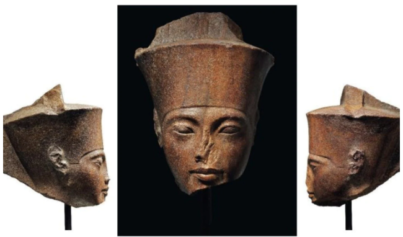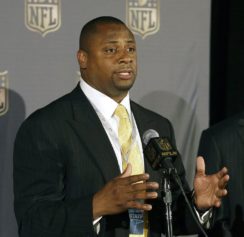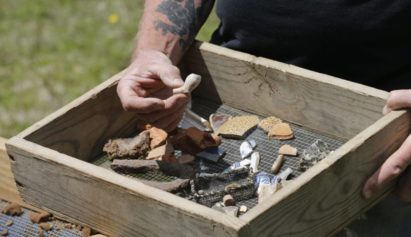On the West End of Atlanta, in the shadow of the historic campuses of Spelman and Morehouse colleges, an education success story is quietly flourishing at Imhotep Academy, under the watchful eye of an attentive staff that has been able to create an exceptionally nurturing environment.
By infusing the curriculum with the seven principles of the Nguzo Saba, the Imhotep staff focuses on the importance of African and African-American history and culture while at the same time pushing the students at the small school to perform at a high academic level. In fact, according to principal Dr. Joe B. Brown, the students at Imhotep—which spans from age 3 to 8th grade—consistently work on material one grade ahead of their current grade. In its admissions, Brown said the school must be sure that students can keep up—but the staff can sometimes push students who may have been underperforming elsewhere to leap ahead academically.
Atlanta Black Star sat down with Dr. Brown and Charlton Harris, the school’s owner and business manager, to talk about what makes Imhotep different from other private schools in the area.
When parents are looking at school options and they come across Imhotep, what is it you hope they take away?
Dr. Brown: Primarily the fact that we try to incorporate our students into an environment of familiarity. They are around students with like skills and like abilities and like talents. In public schools, you have a cross section of students. Some are there for the purpose of learning; some are not. But at our place, we have students here for the purpose of learning and trying to develop. The other thing is we want them to understand they are special to us, very important to us. We are trying to bring them an ancient culture that many of their parents aren’t even familiar with, from an African historical perspective. I think that culture is very important for our children to learn.
What does learning about their culture bring to young students that enhances them academically?
Dr. Brown: As you know, much of the history we read in public schools has very little to do with our people. But at our school, we try to make sure they understand what Africans and African Americans have done down through the years that are outstanding, that have made significant contributions to society. This gives them an opportunity to know they can be on that same train.
What have you both seen in terms of how this kind of information affects a young mind that might not have been exposed to it before?
Charlton Harris: The biggest way it affects them, it gives them a belief in self, a belief in their abilities and what they are able to do. And gives them a foundation that allows them to not only challenge their community but challenge outside of their community and excel. It gives them a sense of pride in who they are and what their capabilities are. And it allows them to see mentors in history who have achieved and done great things and allows them to strive to match and surpass those that came before them.
Dr. Brown: What we do with our children is significant: we work one year ahead of their grade level. So if students are in kindergarten, right now they are working with first-grade material. Then when they come in in the fall, they will review first-grade material and then go immediately into second-grade material. In the spring they will be working with third-grade material. We keep them a year ahead, year round.
How does that work to their advantage as they move on?
Dr. Brown: It places them ahead of their cohorts. Once they leave us in the 8th grade, we have not had any students come back and say they were behind the curve. The opposite has occurred. Many schools they attend contact us and say our students are ahead of their students.
In an age when they can look in the White House to see someone who looks like them, is it necessary any more to go to that extent?
Dr. Brown: We have Obama all over the building. We have George Washington Carver, we have all kinds of outstanding superstars, I call them, all over the building. I want the students to see them every single day. Obama’s not enough. It’s good, don’t misunderstand me, but we want them to see across-the-board contributions. We try to cover the whole gamut.
Harris: A lot of times when we look at our history lessons, we do not exist in history until slavery. That’s the first time children of color get to see their existence. They were brought on ships. Nothing about what they did prior to being put on slave ships. They don’t know anything about any African cultures. Then we go from slavery right to civil rights, Martin Luther King, we might hear about George Washington Carver along the way, and then we’re in modern day. When African Americans look at themselves and the rest of the world looks at us, they sort of look and say, ‘Well, what have you done?’ They never had a chance to learn about ancient Kemet civilization and African cultures and how they gave to the rest of the world, how they gave to Rome, to the Greeks, how Imhotep, who we’re named after, was the first architectural genius. These are the things they don’t know, the world doesn’t know. It’s kind of hard to have pride in who you are as a person when the first thing you learn is that you were a slave. But yet other cultures are able to go back and say my parents were from Spain, England, Greece and be able to go and touch cultures there. And our kids don’t really know they can go and touch cultures all over Africa.
Have you had enrollment challenges because of the collapse of the economy?
Dr. Brown: At this point we are experiencing nothing less than what other private schools are experiencing. That has to do with parents being downsized in their employment. Parents transferring to other cities, other states. We also have single parents with one income, and it becomes very difficult to pay private school tuition. However we do want to become attractive to those parents who can afford to send their children to a school such as ours, a school with the quality we have. We try to look at somewhere between the 85 and 95th percentile of the intellectual curve. However we sometimes have to take students who are below that because of the economy. So it’s important we look at trying to recruit students can afford to pay tuition and students whose parents have great expectations for them. We use national exams, standardized tests. As you may know, those tests are used to determine the prison population for African-American boys. We try to make sure we get the best of that crop so we can them develop them to become better citizens.
Harris: We have been able to look at students who were undereducated but capable of learning. One thing we find, especially with our young men, is that when they are very academic but not challenged, especially in the public school environment, they start acting out, in an effort to find something to keep them busy. They would then be labeled as behavior-disordered children. Studies have shown as many as 50 percent of them are highly academic. We bring these young men in, we redirect their energy academically, many times we find them out-excelling other students in the classroom. It’s only because in another institution, no one took the time to realize they are working with genius. We do find we are able to reach many of those children and accelerate them.


